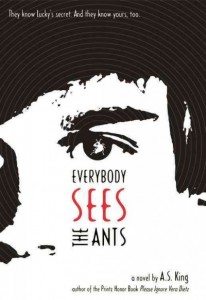 If what you want most in a novel is a protagonist who gets it, who’s wading through the same emotional crap you are, who’s fed up with the ineffectual adults in his life and having to just accept the way things are, and most of all, a guy who is funny as hell, then Lucky Linderman is the protagonist for you.
If what you want most in a novel is a protagonist who gets it, who’s wading through the same emotional crap you are, who’s fed up with the ineffectual adults in his life and having to just accept the way things are, and most of all, a guy who is funny as hell, then Lucky Linderman is the protagonist for you.
That’s not to say that Lucky’s life is all that great – it’s pretty crappy, actually. His dad is emotionally distant from the family; his mom meekly inhabits the edges of her own life, preferring to spend time swimming laps; his grandfather is/was a Vietnam War POW/MIA and his absence has permeated the whole family; and then there’s Nader McMillan, a serious bully who’s been terrorizing Lucky since grade school and whose bully of a father has the school administrators turning a blind eye to Nader’s campaign of terror on campus. Lucky’s self esteem is about as low as it can get and he can’t believe how messed up everyone is around him. His only escape is when he spends time in the jungle with his Granddad. In the jungle, Lucky is confident, strong, tough – he’s on a mission to rescue Granddad from the POW camp and finally bring him home. What does it matter that all these rescue missions are in his dreams; since Lucky has always awoken to some real souvenir – like a half-smoked cigar – he knows the visits are real. If Lucky could only find a way to bring some of that courage and strength into his “real” life, things might just get a little bit better.
I loved every page of Printz Honoree A.S. King’s smart, hilarious, sarcastic and completely human Everybody Sees the Ants. The emotional honesty, fully-drawn characters, spot-on voices and perfect blend of realism, fantasy, and coming of age, all combine into a stunning page turner that will appeal to every teen reader and many adults as well. Of course, the partying, artillery-toting, Twister-playing ants steal the show every time they appear before Lucky’s eyes, taunting him, cheering for him, or making snarky, perceptive comments about Lucky’s circumstances. What Lucky slowly comes to realize is that we all have baggage; we’ve all been victims at one time or another and yet we all cope somehow. When faced with the choice of doing nothing or doing something, Lucky has plenty of examples showing him that doing nothing means nothing will change. Lucky finally accepts that he deserves better and understands that it’s up to him to make his life what he wants it to be. In the end, it’s not Granddad that Lucky needed to rescue, it was himself.
- Posted by Cori


1 Comment